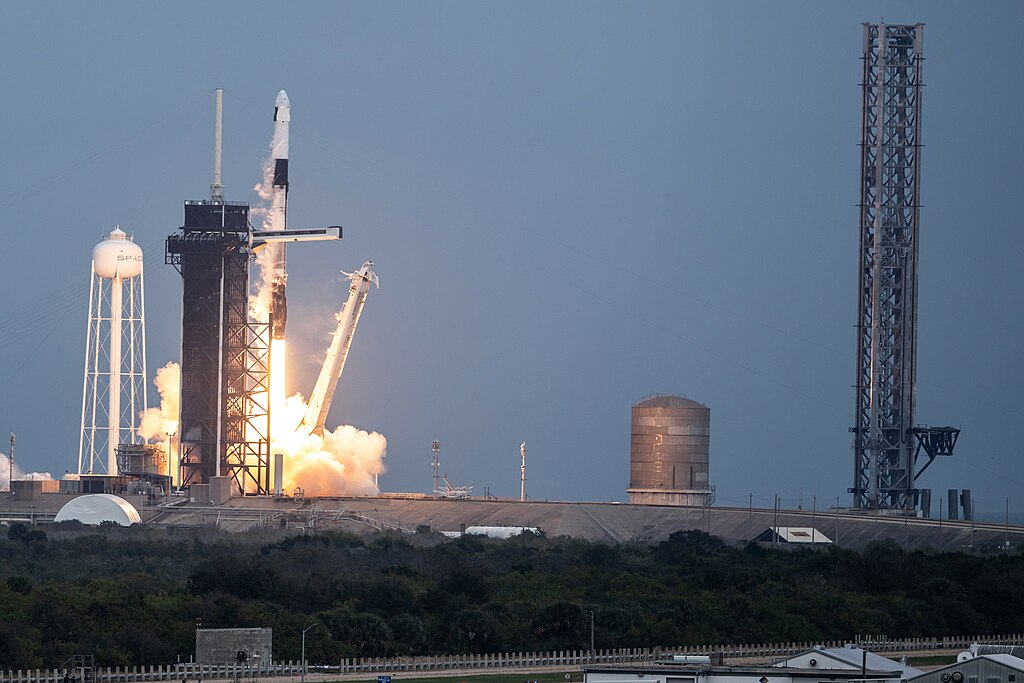A SpaceX Starship rocket broke apart minutes after launching from Texas, disrupting airline flights over the Gulf of Mexico due to falling debris. The rocket, carrying its first test payload of mock satellites, lost contact with mission control eight minutes after liftoff at 5:38 p.m. EST (2238 GMT).
Video captured by Reuters showed streaks of orange light over Port-au-Prince, Haiti, as fragments descended. SpaceX Communications Manager Dan Huot confirmed the loss, citing an upper-stage anomaly. Elon Musk later revealed a liquid oxygen leak caused pressure buildup, leading to the breakup.
The mishap forced dozens of flights to alter routes or delay departures from Miami and Fort Lauderdale, according to FlightRadar24. The FAA briefly diverted planes in the debris area but resumed normal operations soon after. While space launches routinely close airspace, anomalies like this expand restricted zones to protect aircraft.
This failure marked SpaceX’s seventh Starship test since 2023. The “new generation” upper stage, 2 meters taller than previous models, aimed to achieve a controlled splashdown in the Indian Ocean. The setback challenges Musk’s goal of conducting 12 Starship launches this year, as the FAA may open an investigation, potentially grounding further flights.
The incident follows Blue Origin’s successful New Glenn rocket launch just a day earlier. Musk, maintaining optimism, posted a video of the debris on X, commenting, "Success is uncertain, but entertainment is guaranteed!"
Despite the setback, SpaceX remains focused on advancing Starship technology for future Mars missions and satellite deployments. The reusable Super Heavy booster, however, successfully returned to its launchpad.
SpaceX’s test-to-failure approach continues to push engineering limits while facing challenges from regulatory scrutiny and public safety concerns.



 SpaceX Updates Starlink Privacy Policy to Allow AI Training as xAI Merger Talks and IPO Loom
SpaceX Updates Starlink Privacy Policy to Allow AI Training as xAI Merger Talks and IPO Loom  Nvidia Nears $20 Billion OpenAI Investment as AI Funding Race Intensifies
Nvidia Nears $20 Billion OpenAI Investment as AI Funding Race Intensifies  OpenAI Expands Enterprise AI Strategy With Major Hiring Push Ahead of New Business Offering
OpenAI Expands Enterprise AI Strategy With Major Hiring Push Ahead of New Business Offering  Elon Musk’s Empire: SpaceX, Tesla, and xAI Merger Talks Spark Investor Debate
Elon Musk’s Empire: SpaceX, Tesla, and xAI Merger Talks Spark Investor Debate  Instagram Outage Disrupts Thousands of U.S. Users
Instagram Outage Disrupts Thousands of U.S. Users  Rio Tinto Shares Hit Record High After Ending Glencore Merger Talks
Rio Tinto Shares Hit Record High After Ending Glencore Merger Talks  Alphabet’s Massive AI Spending Surge Signals Confidence in Google’s Growth Engine
Alphabet’s Massive AI Spending Surge Signals Confidence in Google’s Growth Engine  AMD Shares Slide Despite Earnings Beat as Cautious Revenue Outlook Weighs on Stock
AMD Shares Slide Despite Earnings Beat as Cautious Revenue Outlook Weighs on Stock  SpaceX Prioritizes Moon Mission Before Mars as Starship Development Accelerates
SpaceX Prioritizes Moon Mission Before Mars as Starship Development Accelerates  TSMC Eyes 3nm Chip Production in Japan with $17 Billion Kumamoto Investment
TSMC Eyes 3nm Chip Production in Japan with $17 Billion Kumamoto Investment  Global PC Makers Eye Chinese Memory Chip Suppliers Amid Ongoing Supply Crunch
Global PC Makers Eye Chinese Memory Chip Suppliers Amid Ongoing Supply Crunch  SpaceX Reports $8 Billion Profit as IPO Plans and Starlink Growth Fuel Valuation Buzz
SpaceX Reports $8 Billion Profit as IPO Plans and Starlink Growth Fuel Valuation Buzz  Tencent Shares Slide After WeChat Restricts YuanBao AI Promotional Links
Tencent Shares Slide After WeChat Restricts YuanBao AI Promotional Links  Trump Backs Nexstar–Tegna Merger Amid Shifting U.S. Media Landscape
Trump Backs Nexstar–Tegna Merger Amid Shifting U.S. Media Landscape  Sony Q3 Profit Jumps on Gaming and Image Sensors, Full-Year Outlook Raised
Sony Q3 Profit Jumps on Gaming and Image Sensors, Full-Year Outlook Raised  Palantir Stock Jumps After Strong Q4 Earnings Beat and Upbeat 2026 Revenue Forecast
Palantir Stock Jumps After Strong Q4 Earnings Beat and Upbeat 2026 Revenue Forecast 































